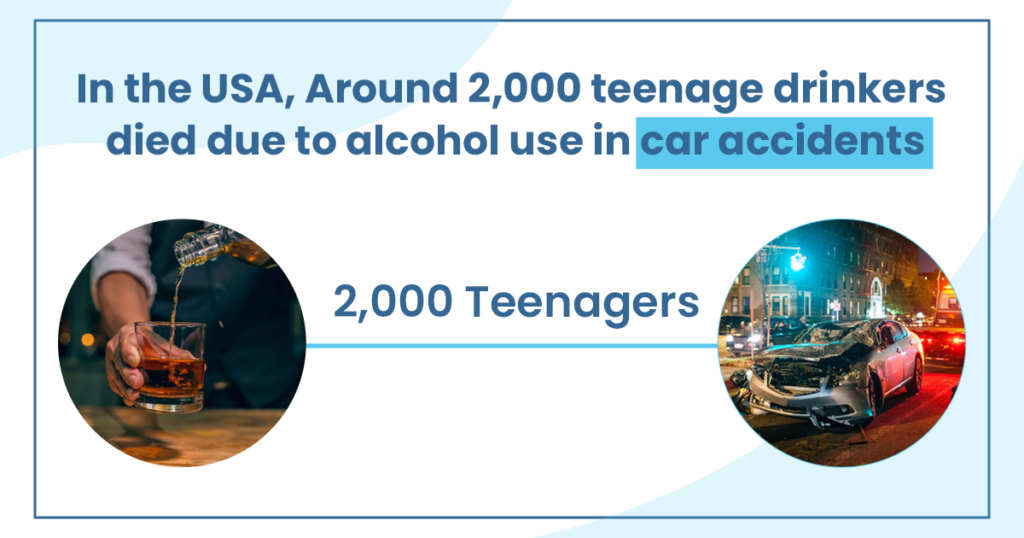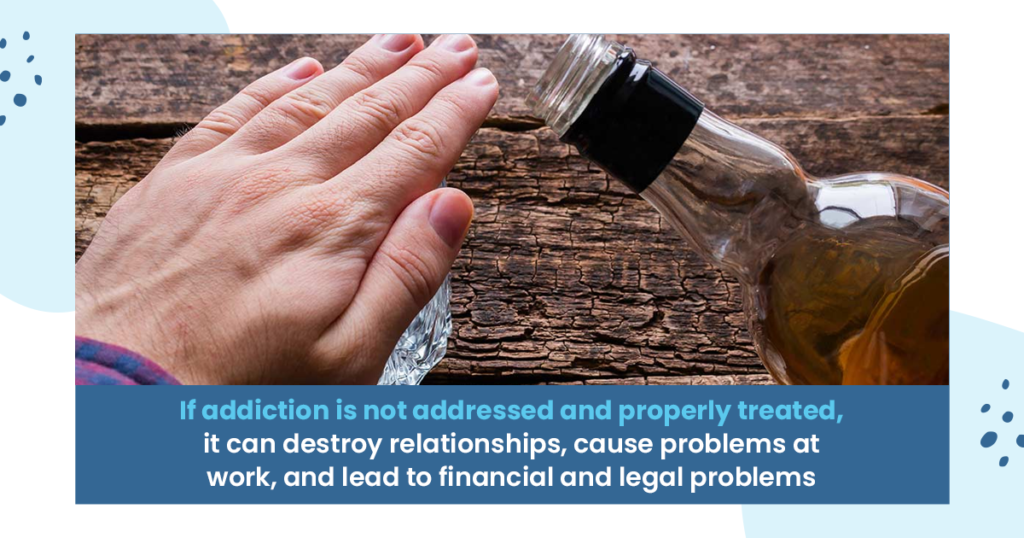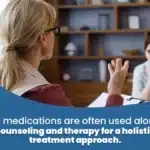
Withdrawal symptoms from an alcohol or drug addiction can worsen over time if a person does not address the problem. Treatment typically begins with medical detox and therapy led by a mental health professional. An addict can develop to believe that the substance is too strong and too powerful to conquer each time they attempt to combat addiction and run against a chemical barrier.
Even subtle symptoms of withdrawal, such as sweat or tears in the eyes, might remind people of the physical pain they would face if they were to try to stop using drugs or alcohol. Drug addiction is highly excruciating, and such substance use disorders ruin many lives.
Addiction Affects Us All
Because of the large number of people addicted to drugs or alcohol, we can no longer ignore the detrimental effects of drug use on families and society. In addition to harming one’s family, substance abuse has ramifications for the individual’s acquaintances, coworkers, and broader community members.
Alcohol addiction leads to erratic behavior, and central nervous system depressants can cause mood swings and other tolerance issues.
You may feel a desire to shield your loved one from the negative social, financial, medical, or legal consequences of their addiction. Your relatives and friends may begin to distance themselves, or you may neglect your own needs and commitments.
The effects of drug use and addiction become a significant part of the user’s life. People’s reactions to long-term drug use can range from the following:
- Changes in the brain’s structure or function are tolerated
- Unintentional injury
- Lethal accidents
- Timid behaviors
- Organ systems across the body.
- Power to fight against disease
- Greater chances of infection
- Cardiology issues
- Nausea and vomiting are symptoms of an upset stomach.
- Liver damage or failure
- Mental illness
- Seizures
- Strikes cardiac arrests
- Difficulties in making decisions
- Damage to the brain
- Decreased emotional well-being
- Increasing health problems
- Concerns pertaining to the law
- Addiction leads to financial collapse
- The deterioration of human relationships
- Divorce and relationship issues
Addiction Dependency
Addiction dependency refers to symptoms after an extended break from prolonged drug usage, including changes in behavior, thoughts, and physical symptoms like dizziness or shaking. This withdrawal includes a desire to use the substance, difficulty stopping, and a determination to continue using the drug despite the negative consequences.
Drug abuse sometimes causes a user to put their personal, professional, interpersonal, and intellectual obligations before their use of drugs. Substance abuse treatment is intrinsic to overcoming the conditions caused due to addiction. Tolerance to a medicine increases with repeated usage, requiring higher doses to get the same results.
Abusing drugs regularly increases your vulnerability to addiction and the unpleasantness of drug withdrawal when you suddenly stop using them.
According to the length of addiction, the type and amount of drugs used, and the genetics involved, prescription drug abuse in teens can have very different long-term effects from one person to the next.
Why Addictions Must Be Treated
For various reasons, people experiment with drugs, such as for curiosity, amusement, or peer pressure. Anxiety and sadness are two common reasons people self-medicate with drugs and alcohol, but they’re not the only reasons. Even though they may be causing substantial financial harm to their family’s finances, people like this believe there is no pressing problem that has to be addressed.
As a result of their addiction, the person may not be able to see any other possibilities for a fulfilling existence. According to the National Institute on Drug Abuse, the brain might become resistant to the drug’s effects after repeated exposure or use.
Addiction is a chronic condition (lifelong). Addicts are driven by an excessive need or need to engage in risky behaviors or harmful substances, even though they know the negative consequences. When they try to stop, they are helpless against their own will.
If addiction is not addressed and properly treated, it can destroy relationships, cause problems at work, and lead to financial and legal problems. Excessively using alcohol and drugs can cause various serious health issues and even be lethal. Addiction treatment includes rehab, counseling, and medication. Detox starts with physical healing before you begin proper treatment.
Physical and psychological well-being are intertwined in the process of recovery. There are various options for dealing with physical addiction, including medication, massage, acupuncture, and dietary therapy. Counseling, support group participation, and relapse prevention teaching are all possible treatments for psychological addiction.

Frequently Asked Questions
What is the effect of addiction?
Individuals who go through an addiction face multiple health issues such as heart attack, mental health disorders, stroke, etc. Blood tests or X-rays done by a medical professional can help determine any harmful effects the substance use has caused to your body.
What are the causes and effects of addiction?
To feel euphoria and pleasure, people may try some drugs or begin excessively drinking alcohol. In contrast, some people develop such a condition in an attempt to self-medicate for the treatment of depression.
What are the four symptoms of addiction?
Four symptoms of addiction may include:
– Severe mood swings.
– Weight changes.
– Intense cravings to drink or ingest a drug.
– An inability to control your intake of a substance.
If you are experiencing these symptoms, you must seek treatment at a credited rehab center like The Haven.
What are the factors affecting addiction?
The genetic predisposition or environmental factors are responsible for a person’s inclination towards getting addiction. Family history and other things will affect the likelihood of addiction as well.
What are the effects of taking drugs?
The agitation for mood swings, depression, anxiety, and lack of alertness are the signs that one may have due to illicit drugs or prescription drugs.
The Haven is the Go-To Place for Addiction Treatment
Dealing with an addiction can be difficult and leave lasting impacts on an individual’s mental and physical health as well as that of their loved ones. The Haven treatment center aims to provide patients with a safe and comfortable environment to overcome their addiction to alcohol or drugs.
Our proven detoxification methods professionally led therapy sessions, and effective aftercare programs have helped hundreds of patients reach recovery.
If you or a loved one is showing signs of a substance abuse disorder, do not hesitate to call us at (561)-3288-627, speak with a counselor, and learn more about our various services. Our team is passionate about providing a successful long-term recovery for all our patients.
Drug and alcohol addiction is never an easy problem to face, but it is even more difficult to face alone. Maintaining a solid support system through family members and friends may just be the intervention that an addict needs to survive the deadly grasp that the disease of addiction can take hold. If you know of a family member who is suffering from drug or alcohol addiction, don’t be afraid to speak up and get them help. It won’t only save his or her life, but it will save yours as well.






